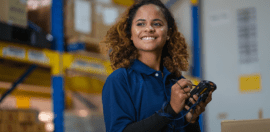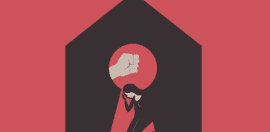A community acting against family violence

28 November 2019 at 8:07 am
One Aboriginal community has co-designed an online family violence resource for their own people, prioritising the voices of Australia’s First Nations populations in positive change, writes Renee Fiolet from University of Melbourne.
In Australia, ongoing systemic racism directed at First Nations peoples has created a significant level of mistrust.
This mistrust is often associated with police and welfare services who were involved in the traumatic forced removal of children from their Indigenous parents, leaving scars for an entire people as a result of the Stolen Generations.
It is not surprising then, that many First Nations peoples do not feel safe when seeking support, particularly when it comes to family violence.
Australia’s First Nations peoples experience high levels of family violence caused by a multitude of factors. This despite the fact that the core values of the community are built on harmony with family, community and land.
But many First Nations peoples will not seek support for family violence because of barriers such as shame, judgement, fear and culturally inappropriate responses that put many people off accessing family violence resources.
However, one Aboriginal community has worked to make a positive change for their people who are impacted by family violence.
The Wadawurrung community of the Kulin Nations in Victoria, approached researchers at the University of Melbourne to work together to improve the information and advice available on family violence for their people.
After forming an advisory group and developing a terms of reference, the Wadawurrung family violence project was established with support from the Melbourne Social Equity Institute, philanthropic organisation Give Where You Live, and the Safer Families Centre of Research Excellence.
As part of the project, I worked with the community to help determine their needs when it came to providing the right support for family violence.
The Wadawurrung community identified a solution; an online resource tailored to the community’s needs. One that included specific features to make getting help easier.
The community was looking for a resource, available at any time of the day or night – but also one accessible from a cultural perspective, including appropriate use of language, imagery and content.
The community also identified the need to make sure the resource met the needs of both men and women.
Many people also emphasised the fact that those who witness family violence need support too, in addition to those who experience it.
Importantly, the resource needed to offer anonymity, particularly because of fears surrounding child removal.
And finally, it also needed to be culturally safe – allowing a healing space that focused on Indigenous strengths.
Working together, the community advisory group and the university research team collaborated with focus groups to design and develop an online family violence resource for the community.
These group sessions with men and women ultimately informed the eventual design of Burndawan – a Wadawurrung word meaning “safe”.
While Burndawan is specifically for the First Nations peoples in Wadawurrung Country who experience family violence, are concerned about family violence or who use harmful behaviours in their relationships – it’s also a resource for those working in spaces like justice, health or specialist services.
People working in these sectors can refer their Indigenous clients to the site or explore it themselves in order to develop a clear understanding of what resources are available.
There are three main areas on Burndawan – Assess, Act and Heal.
The “Assess” section is designed to provide information that encourages people to assess their own relationships, helping them to develop an understanding about abuse and the impact it can have on families.
One community member talked about the value of weighing up their relationships like this to get perspective on whether they needed help:
“If somebody’s questioning whether they are victims or perpetrators of family violence, they can go onto a website and maybe do an assessment or do a bit of reading and think, ‘Do I resonate with this? Is this what’s happening in my life at the moment?’ It’d just confirm whether they need support and assistance or not.”
The second main area – Act – encourages people to take positive action, communicate well and seek support that can help them to make the changes they would like in their relationships.
The site offers a series of strategies designed to either move forward in continuing their relationships safely or get to the point where they feel safe enough to leave it.
This involves information about how to stay safe, manage things like their finances and housing, as well as strategies for protecting their health.
The third section – Heal – reflects the Wadawurrung peoples’ desire to look forward to a future of healing.
This component includes a social and emotional wellbeing assessment, mindfulness exercises, grounding techniques and the sharing of stories – all aimed at helping to encourage people to begin their healing journey.
Importantly, local Wadawurrung community members have allowed the use of their voices, images and stories here, sharing their strengths with others in the community.
Burndawan is a resource that provides support and encouragement to those who need help. Crucially, because the community have been instrumental in designing and creating the site for their own people, it empowers those who need it to seek help and advice in a safe place, from people they trust.
This week was the International Day for the Elimination of Violence against Women. If you or anyone you know is affected by issues raised in this article, you can visit the Burndawan resource or contact the National sexual assault, domestic and family violence referral service, 1800RESPECT.
This article was first published on Pursuit. Read the original article.








